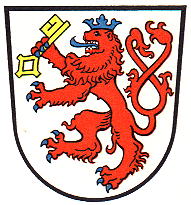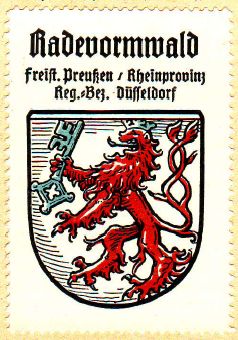Radevormwald: Difference between revisions
Knorrepoes (talk | contribs) m (Text replacement - ".hagd.jpg|center]] <br/>The arms by Hupp in the Kaffee Hag albums +/- 1925" to ".hagd.jpg|center|Wappen von {{PAGENAME}}]] <br/>The arms by Hupp in the Kaffee Hag albums +/- 1925 ") |
Knorrepoes (talk | contribs) m (Text replacement - "Literature" to "Literature") |
||
| Line 22: | Line 22: | ||
{{media}} | {{media}} | ||
[[Literature]] : Stadler, 1964-1971, 8 volumes; [[Kaffee Hag albums]] 1920s. | [[Civic Heraldry Literature - Germany|Literature]] : Stadler, 1964-1971, 8 volumes; [[Kaffee Hag albums]] 1920s. | ||
[[Category:German Municipalities R]] | [[Category:German Municipalities R]] | ||
Revision as of 19:58, 25 January 2017
This page is part of the German heraldry portal Deutsche Wappensammlung |
Heraldry of the World |
|
German heraldry:
|
Selected collector's items from Germany:
|
RADEVORMWALD
State : Nordrhein-Westfalen
District (Kreis) : Oberbergischer Kreis (until 1975 Rhein-Wupper Kreis)
Official blazon
Origin/meaning
The arms were granted on November 7, 1934.
Radevormwald was a settlement on the eastern borders of the county of Berg. It thus had strategic importance and became a city in the end of the 13th century. The lion in the arms is the lion of the Counts of Berg. The oldest seal of the city, dating from the 14th century, already shows the lion with a key. All later seals show the same image. The origin of the key is not clear. It may have had a religious meaning, but it has also been speculated that it symbolises the iron industry in the town.
In the early 20th century the arms below were shown in the Kaffee Hag albums. These arms show the same composition, but in different colours.
| The arms by Hupp in the Kaffee Hag albums +/- 1925 |
Contact and Support
Partners:
Your logo here ?
Contact us
© since 1995, Heraldry of the World, Ralf Hartemink 
Index of the site
Literature : Stadler, 1964-1971, 8 volumes; Kaffee Hag albums 1920s.













